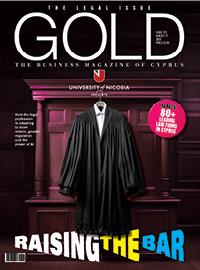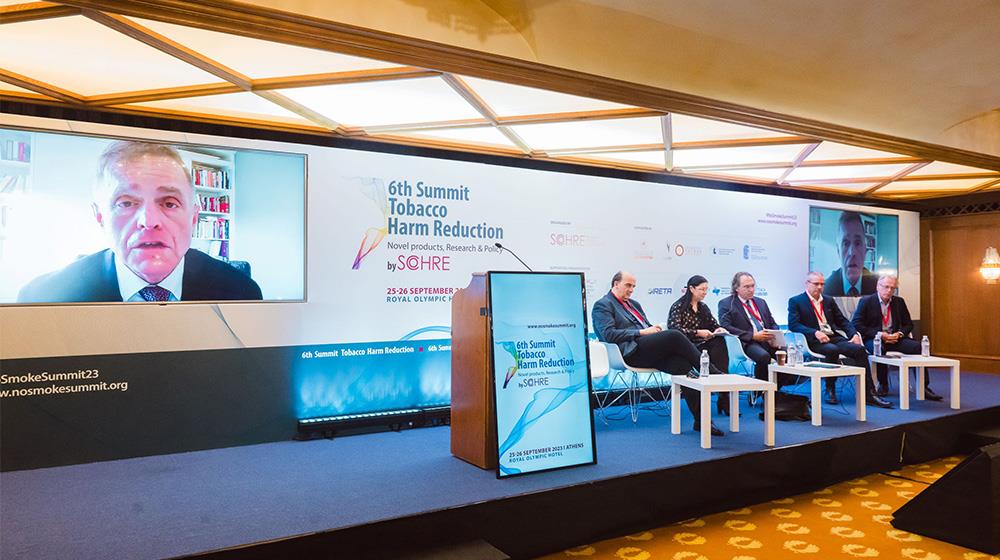Attending the 6th Summit on Tobacco Harm Reduction in Athens, CBN recently learned more about global efforts for a better approach to the global burden of smoking.
The 25-26 September Summit was organised by SCOHRE, an international scientific association of independent experts on Smoking Control & Harm Reduction, and was attended by over 250 participants from around the world, with others also joining in online.
During the opening event, SCOHRE President, Professor Ignatios Ikonomidis, noted that, during previous Summits, it has been established that although the prevalence of smoking has decreased steadily around the globe, the total number of smokers has increased, as populations have grown. The conference explored how novel smoking products, such as heated tobacco products, vapour products (electronic cigarettes) and nicotine pouches also including snus, show a smaller emission of toxic substances compared to conventional cigarettes. It also took into account increasing interest in Tobacco Harm Reduction as a tool to reduce the detrimental consequences of cigarette smoking.
With experts addressing the event underlined that more data is needed for politicians and public health regulators to make informed decisions, the 6th Summit’s objective was to offer opportunities for scientists of different countries to present, discuss, and challenge recent data. Another aim of the event was for the Summit to provide an environment where regulatory authorities and policy makers could interact with the scientific and medical communities on the prospective course of action ‘For a Smoke-Free World.’
Prof. Giuseppe Biondi Zoccai, Dr Fares Mili and Prof. Anastasia Barbouni, added to the opening remarks regarding the Summit’s goals while, during a session entitled ‘Information & Misinformation About THR (Tobacco Harm Reduction,)’ the discussion focused on the assessment of global regulation, legislation, and existing scientific evidence for THR products.
Tim Phillips, Managing Director, Tamarind Intelligence, UK said that THR sector may still be small but is growing fast. It is a fact that regulators must deal with a variety of different issues, he said, and in order to conclude to the best decisions they need more data. Also, data must be communicated, and the scientific community should be more active on presenting evidence-based findings to regulators, policy makers and the public.
Besides the need for data-based policies, consumers’ confidence on THR is also an issue of high importance. Increasing awareness of consumers about the impact of smoking and the impact of novel lower-risk alternatives to combustible cigarettes is crucial, Solomon Rataemane, Professor & HOD, Psychiatry Dept, Sefako Makgatho Health Sciences University, South Africa, said. He spoke about the evolution of the relevant legislation in South Africa since the first Act in 1993 until today that a new Bill on tobacco legislation is going through Public Hearings. A main issue that is already being discussed and is expected to come up during this procedure is whether the new THR products should be addressed similarly with the combustible cigarettes, even though there is scientific evidence that switching from conventional cigarettes to the novel non-combustible products is improving smokers’ health.
Professor Giuseppe Biondi Zoccai, Associate Professor in Cardiology, Sapienza University of Rome, Italy, meanwhile, commented that although the wide variability in e-cigarette products makes it challenging to draw definitive conclusions about their overall health impact, and findings and conclusions of umbrella and systematic reviews can vary depending on scope of review, studies included, and methodologies used―professor Zoccai said―still, evidence from umbrella reviews show that e-cigarettes increase quit rates compared to nicotine replacement therapy (NRT), while evidence comparing nicotine e-cigs with usual care or no treatment also suggests benefit.
In his keynote speech exploring the financial aspects of smoking, Professor Andrzej Fal, President, Polish Society of Public Health, Poland, referred to an apparent conflict of interest created by the efforts for smoking cessation; on one hand they reduce the direct and indirect healthcare costs, but on the other hand they also reduce the income gained by excise and VAT taxes. At an era when health expenditures keep growing, and while the total cost attributable to cigarette smoking reaches almost 2% of the world’s GDP, prevention –through lifestyle changes, reduction of behavioural risk factors and harm reduction– is the most effective way of investing in future health. To stop the smoking pandemic and its financial and health effects we need to raise funding for primary prevention, as well as introduce a “less harm, less tax” regulation.
Also, in her keynote speech, Dr Marewa Glover, Director, Centre of Research Excellence: Indigenous Sovereignty & Smoking, New Zealand, gave an update on the recent legislative and regulatory changes in New Zealand concerning smoking and vaping, and presented preliminary research data about the barriers and misconceptions that prevent a part of smokers’ population from achieving smoking cessation. She shared the preliminary data analysis of “Voices of the 5%” research, an ongoing longitudinal qualitative research, from 2020 to 2024, in 62 diverse adults (19-81 yrs) across New Zealand. “We assume everyone knows that smoking kills, but some people really don’t know,” Dr Glover said, adding, “We cannot ignore these people, we must focus more on health education in order to help them,” she added.
On the Summit’s second day, discussions between eminent THR experts, medical doctors and scientists, and announcements of new research evidence, basic and clinical continued, with the agenda including sessions focusing not only on Europe, but also on African and Asian countries, South America, and New Zealand.
The most powerful message of this year’s Summit was that the resistance to harm reduction is increasing as penetration of alternatives to tobacco novel products grows and that nicotine has, according to experts, unfairly been burdened with combustible cigarette smoking hazards.
Scientists and other experts at the Summit pointed out that policies hostile to THR―yet not evidence-based―have been reported on many occasions. They also said that, although harm reduction is for the benefit of consumers and patients and it is one of the agreements in article 1 of the WHO Framework Convention on Tobacco Control (FCTC) signed by 168 Parties, it is not being respected. Policies should also respect that consumers have the right to informed decisions and personal choices, the experts suggested. Given that mixed messages affect the trust of consumers to governments and institutions, SCOHRE is leading an alliance of THR organizations to align communication messages to fight false messages regarding the risk of novel products versus smoking, they said.
“What is needed to showcase the benefits from harm reduction?” was the question which a panel discussion among THR advocates moderated by Dr Dimitri Richter, President of the Council for cardiology practice at European Society of Cardiology, attempted to answer. According to David Sweanor, a Canadian lawyer who has worked in global public health efforts on tobacco for over 30 years, we need to push governments, the health agencies, and the tobacco industry, to gather the available data about harm reduction and convince people in a trustworthy manner about the benefits of harm reduction. “People are buying cigarettes every day, every day we have a chance to intervene by offering a product that is massively less hazardous, doesn’t harm the people around you, and is less addictive; and we can make sure that it is available more widely than cigarettes, at a lower price than cigarettes, with more accurate information about relative risk,” Sweanor said.
Glover, once again referring to the case of New Zealand, which is generally considered successful, said that their policy should not be copied as the best example anymore. She stressed that education is number 1, not taxes. In New Zealand taxes are so high relatively to income, that the main group of the population who smoke, of the lowest socio-economic status, can often no longer afford to buy legal cigarettes, so other problems arise; people turn to the black market, or they cut money from their budget for food. Many policies have negative consequences, especially for the lowest socio-economic groups, but good policies should take into account these consequences.
Dr Fernando Bueno, among other things Medical Lieutenant-Colonel of the Military Health Corps. in Spain, stressed that science is a cornerstone in the fight against tobacco. “The debate on tobacco control must be based on scientific arguments and clinical data, moving away from mere opinions and emotional responses. This is the only way to make progress in the fight against tobacco,” Dr Bueno said, adding that the priorities in the fight against tobacco should be centered on combustible products.
To showcase the bad policies used in many cases, Prof. Konstantinos Farsalinos, among other things cardiologist and research fellow at the Onassis Cardiac Surgery Center in Athens-Greece, used the example of Sweden and of the European Union. Today, Sweden is the only smoke-free country in the world, despite the fact that nicotine use rate in Sweden is similar to the European average (about 24%). However, in Sweden the vast majority of nicotine use comes from snus, whereas in Europe it comes from cigarettes. As a result, death rates from cardiovascular disease, lung cancer, and other cancer types are half or even less in Sweden, compared to the rest of the EU. So, we already have a real-world example, with the best possible long-term epidemiological evidence about reduced risk. “What did the European Union do? ―Prof. Farsalinos asked―they banned snus. It is unbelievable; it is a public health scandal,” he said.
Speaking on behalf of consumers, meanwhile, British pro-tobacco activist Martin Cullip stressed repeatedly that we need to get clear and strong messages out to the public about the scientific evidence on the benefits of harm reduction products, in order to counteract the misinformation launched by opposing parts. He added that we cannot allow these products to be banned now, as the WHO seems to wish, because we will have to wait for some 60 years before we can get them back.
Addition expert Prof. Heino Stover also referred to the successful example of Sweden, where there is a long-standing tradition of snus use, and is the first country in the EU to become smoke-free. “The fact that a non-smoke nicotine delivery system was readily available and widely used seems to be the most likely explanation for Sweden’s great success in reducing smoking rates and smoking related disease,” Dr. Stover said, adding that the example of Sweden shows that accepting less risky nicotine administration saves lives.
Smoking prevalence remains very high in the Association of South-East Asian Nations―ASEAN―region, and harm reduction is received with scepticism. In the first keynote speech of the day, Professor Sharifa Ezat Wan Puteh presented extensive and very interesting data about smoking and policies in the ASEAN region which is a political and economic union of 10 states in South-East Asia that represents a population of over 600 million. The region is no longer unanimously “anti-vape” as it was a decade ago when vaping started to get popular. Today, several countries have made vaping legal, while others continue out-law it. Smoking and vaping measures differ by country, as harm reduction approach does; impact on smoking rates also differs widely, but smoking prevalence remains high.
In his keynote speech, Professor Konstantinos Farsalinos discussed the complex socio-political and ethical aspects of tobacco control in the 21st century, focusing on Tobacco Harm Reduction and the obligation of politicians, regulators, and scientists to have an open-minded, honest, and evidence-based approach, beyond ideologies and prejudice. “The truth is, he said, THR is a human rights issue. Harm Reduction is not just about reducing the harm from substance use, but is also about addressing stigma, marginalization, criminalization, inequalities, and oppression, in an effort to protect health, dignity and liberty, including the liberty of making informed personal choices.” Unfortunately, today the anti-harm reduction hysteria is becoming an authoritarian form of political correctness for smokers and for scientists with different views. But we all should not forget the provisional nature of scientific knowledge ―that proper scepticism is the foundation of intellectual progress, he concluded.
The Summit concluded with a panel discussion between eminent experts representing THR associations to explore how they can collaborate to create new opportunities for the education of health policy experts, regulators, and the public as well as advocating for new research to generate more data, for evidence-based policies. Gathering well-documented data, practices, and policies from all over the world is extremely important to persuade governments, regulators, policymakers, and the public to accept the value of Tobacco Harm Reduction, which is a rapidly evolving field, Tim Phillips from ECigIntelligence said. It’s not enough to generate data, Jeannie Cameron, representative of the UKVIA, agreed. Data must reach policymakers, but they need to be translated in a way that they can understand it in order to help them make evidence-based decisions. Mary Stamp, Trustee of the New Nicotine Alliance of UK, shared information about the situation in the UK, where the need for the government to embrace harm reduction methods has been recognized. Since 2015, the Annual Reviews of Public Health England have consistently shown that vaping is 95% less harmful than smoking, while in 2017 it has been estimated that 50,000 smokers quit smoking using a vaping device.
SCOHRE recognizes that harm reduction could make the lives of people better and has the ambition to try and get resources to build an Observatory of the smoking habit related to health outcomes in Europe, an announcement released after the event’s closing noted.
View information on speakers and watch the sessions videos on-demand through on the event’s website: www.nosmokesummit.org









